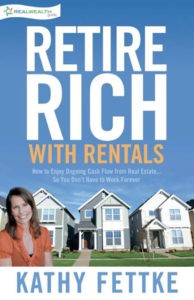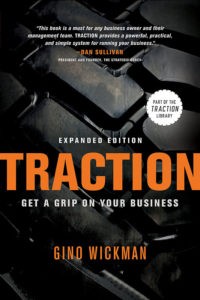
Listen to the podcast here:
—
Watch the episode here:
2006 Market Compared to Now with Kathy Fettke

Our guest is Kathy Fettke. Thanks for being on the show, Kathy.
Thanks for having me.
I’m honored to have you on the show. Kathy is Co-CEO of Real Wealth Network and bestselling author of Retire Rich with Rentals. She’s an active real estate investor, licensed real estate agent and former mortgage broker specializing in helping people build multimillion-dollar real estate portfolios that generate passive monthly cashflow for life. She’s a frequent guest expert on CNN, CNBC, Fox, Bloomberg, NPR, CBS, MarketWatch and The Wall Street Journal and now also The Real Estate Syndication Show. She is also among the top 100 most intriguing entrepreneurs by Goldman Sachs two years in a row. She hosts two podcasts: the Real Wealth Show and the Real Estate News for Investors. Both are in the top ten podcasts on iTunes for listeners in 133 different countries. Her company, Real Wealth Network, offers free resources and cutting-edge education for beginners and experienced real estate investors. Kathy is passionate about teaching others how to create real wealth, which she defines as having both the time and the money to live your life on your terms. I appreciate that, Kathy. That sounds amazing. In case the audience haven’t heard of you, give us a little bit more about who you are and where you are and let’s dive in.
Many years ago, I was just starting out. I didn’t know anything about real estate. You’ve got to start somewhere. Many years later, I am the Co-CEO of Real Wealth Network. We have over 42,000 members. We’ve raised over $120 million for different syndications ranging from multifamily to land development to private lending, even a resort in Costa Rica. We’ve done a lot of great things. Some have been totally out of the park 40% return type deals and others not so much. We’ve been through a downturn that hit Rich and me hard. We’ve done some syndications that were hard. I could talk about the good ones all day long but maybe learning from the bad ones is what people need to hear.
I’ve heard your story and I’ve heard the story about you and Rich and it’s amazing. I would love to hear it but we don’t have time to hear that amazing story, unfortunately.
You can read it in my book. It’s the opening chapter. You can read it in ten minutes in Retire Rich with Rentals. It’s what got us started when I was shopping for my kids at garage sales. I know what it’s like to struggle and try to build something from nothing and then build it and then lose it and build it back. I’ve got lots of years of experience now.
[bctt tweet=”Raising money is totally easy. The hard part is finding the team and the deal that makes sense.” username=””]
I would highly recommend it. I’ve seen you and Rich at a conference in Denver, Joe Fairless’s Best Ever Conference. It’s an amazing story. You and Rich have created such an amazing business and had success. You all are doing so well and are experts in this field. I know everyone looks up to you all for your expertise and advice. I would love for us to talk about how you’re approaching the market and make sure your investors are taken care of. Everybody says the “market” the way it is and all these things. I love to hear your opinion on the economic outlook type.
Nobody knows, that’s the bottom line. We do know one thing. This is the longest expansion in history and that’s the only fact we have. We don’t know if it’s going to continue to expand. We don’t know if we’ve got a recession around the corner. Some people will argue all day long that the expansion is going to continue for years to come. Others will say that they know we’re going to see a downturn and we’re already in it. The bottom line is I’ve been through a downturn, I can assure you it is difficult. The housing itself won’t be the cause of a recession for sure because the loans that have been given in the past many years have been very solid. The prices have gone up.
People are locked into low rates. It’s more expensive to rent than to own a property. People aren’t going to be walking away from a bunch of equity low rates to pay higher rents. That’s not going to happen. I don’t see a housing crisis. However, we have a massive debt crisis in this country that is out of control. Warren Buffett says don’t worry about it. Maybe you shouldn’t worry about it. Either way, starting in 2006, we had a pretty good idea something was wrong and nobody knew how that was going to blow up. Like most people, I had no idea. Because I had my Real Wealth Show on, I get to interview people like Robert Kiyosaki and learn a lot. We’re not at the beginning of a boom market, everyone can agree on that. When you’re in somewhat uncertain times, then you have to be a little more careful. You can still invest aggressively but with different parameters in place. For example, back in 2006, I’m based in the Silicon Valley of California. There were lots and lots of money, but people don’t have a clue about investing.
People were buying at the top of the market. They weren’t looking at cashflows. I’ve had people come to me and say, “I bought a fourplex in Berkeley for $2 million. Do you think that’s a good investment?” I would say, “What’s the cashflow?” They’d say, “I’m not sure. What do you mean by that?” That’s the type of thing you don’t want to be doing is buying at the top and having no clue about what you’re doing. You need to be educated. Back then we were helping people sell those bubble properties or those properties that wouldn’t perform so well in a down-market and acquire high cashflow properties in markets where jobs were going, where there’s population growth. At the time, that was Dallas, Texas for sure. We helped thousands of people sell their investment properties in California at the peak and 1031 Exchange them to Texas where that boom hadn’t happened yet.
We saw the jobs and the population and the property prices were so low. You could quintuple your cashflow and get way more for your money in Dallas and be more diversified so that when that downturn came, most of our investors didn’t even feel it. Their net worth was not affected by anything that grew. Their cashflows grew. They rode through that 2008, 2009 world economic collapse without even feeling it. If there hadn’t been a collapse, they would’ve done fine too. That’s what to look at these days is how do I move forward buying things that are going to hold up no matter what? The keys are follow the jobs, follow the population and the cashflow. I would add a fourth to that, low leverage. If you can stay low leverage because even if you do all those things right but you over-leverage and maybe rents go down a little, you’re going to find yourself in trouble.
You were talking about 2006 you felt something was wrong but you started to act. How do you compare that feeling to now?

It’s very similar, we have a debt problem. Back then it was a mortgage debt problem. Now, it’s corporate debt and national debt problem and credit card and student loan debt. It’s not housing. We’re not the culprits this time. We’re the good guys in the game. The people in housing, except for some multifamily people, but single-family for the most part, you have to qualify, you have to put money down, you have to prove you can pay it back. In multifamily, there are people who are over-leveraged and that concerns me. If there is a housing collapse, it could hit certain multifamily investors harder than others. I see a lot of young people jumping in. They don’t have the experience and they’re building. They think, “I am going to leverage to the hill.” What they have to understand is if they’re syndicating and using other people’s money, don’t practice on other people’s money. Keep their money safe, first and foremost, because for them maybe that is their retirement. You don’t want to wake up one day having lost everybody’s retirement.
You mentioned having to be educated. How did you educate yourself and maybe how do you recommend people educate themselves now so we understand the market and are now prepared?
I would get my advice from old people. That’s the best way I could say it. People that have been through several cycles. There are a lot of people who are getting their education from “gurus” that have only been in the business for three years or four years. I’m not saying they’re not good investors. I’m saying they don’t have the experience necessary that someone with 20 to 40 years of experience would have. If you’re working with anybody at all, whether you’re joining someone else’s syndication or syndicating yourself, make sure you have that wise person of experience on your board of directors or as an advisor or as part of your team. Maybe give him a little section or some shares or units in the project so that they’re there to help guide you through the process.
That would be key with any of our deals. We do land development, we’re building subdivisions, we build to rent communities all across the country. I don’t know how to do that but I’ve got partners who do. I’ve got people who have done it for 30 to 40 years who have amazing track records. To compare it to 2006 to now, there’s a lot of debt that is going to come due at some point. Whether it’s corporations that were going to have to downsize and that could cost job losses or these pensions that can’t be paid and people aren’t going to have the retirement they thought they were going to have. That kind of crisis is going to be very serious.
It doesn’t necessarily mean it will affect the housing or rental market. If anything, it will make the rental market stronger. You just have to make sure you have the right product. Don’t be over-leveraged. You don’t want to be on any extreme, in my opinion. If you’re in A class, if there’s a recession, people can maybe afford A class so they’re going to move to B. If you’re in the nasty part of town that’s high crime, during the recession maybe those tenants can afford to move up. The extremes, I wouldn’t go too low-end and I wouldn’t go too high-end. Definitely be careful about market saturation. Make sure you understand units coming online because, at the end of the day, it always comes down to supply and demand. If there’s too much supply, your rents are going to go down and that’s going to be painful.
Is there something specifically you use to determine the market saturation and where you feel comfortable?
[bctt tweet=”Develop four or five leaders in your company so that all you’re dealing with is the leadership team.” username=””]
I would make sure you have very good relationships with local brokers. Brokers will be able to pull reports, the regular places where you get your data for your multifamily. You want to make sure that you understand permits and what’s being built in the area and single and multifamily because of the overbuilding. We’re seeing a little bit of that on certain parts of Dallas and certain parts of New York, Seattle, even San Francisco and LA. There are a lot of units coming online. It’s taken ten years for it to happen. They’re just now coming online. You can go to your local planning commission and find out. Whatever resources you subscribe to when doing your research on multifamily, make sure that’s one of the data points that you look for.
Are there any other ways you’re approaching the market to make sure that your investors are taken care of?
There are huge gains in land development, whether building apartments or single-family homes or whatever you’re building. We’ve been buying land and titling it. We’re either selling the entitled lots or building the houses and selling them. That could be considered high risk because anytime you build anything, you’re somewhat at the mercy of the local planning commission and those people are politicians and they change. One year you might have your approvals or you think you have your approvals from the politicians who got elected and maybe are pro-growth but then the next round of politicians maybe are slow growth and they might not like your project anymore. It’s very risky anytime you build. The way that we mitigate that risk is number one, we pay very high preferred returns. I want my developer partners to know that our investors get paid first and they get paid last. They don’t get developer fees. They get paid at the end when it’s done. Our investors get as much as 15% preferred return because I want to know if this project goes over-budget or takes longer, the investors are getting paid, not you. They get paid at the end, the developer. That’s number one.
I’ve heard numerous people say that with any type of development, there may not be a preferred return or maybe many years.
That’s okay but for me, don’t bring me a project unless you’re confident enough. I don’t think anyone should be making less than 15% on a development because it is risky. If you can’t bring me a project that promises that, then that does put your money on the line there. That is like if the first dollar is out, it goes to the investors. If I don’t finish this thing in time or it goes up under or over-budget, it comes out of the developer profit, not the investor. That’s how we protect the investors. It’s probably too much. Maybe 12% would be okay but these people are putting up their money to make this happen. They should be rewarded first and foremost.
The second, and this may seem extremely shocking to you, but we don’t take on debt because the number one reason that many builders went into bankruptcy and lost everything, they lost their land, they lost their projects, banks foreclosed. Even if they had good projects, banks failed and they couldn’t finish them because their construction loans disappeared. Even though they were doing everything right, but the banks failed. There was no money. The reason that builders got absolutely wiped out was because of debt. Because when a lender lends on a construction project, they’re tough. If you’re not selling at a certain sales space, if you’re not getting things done on time, they will foreclose on you. I will give you an example. This was a very cool project. My developer partner found some lots in Reno, it was very difficult. Reno Nevada has massive job growth. We’re excited about that market.

We somehow found land and we found land from another group who had leverage. They got a hard money loan. Their entitlement didn’t happen as quickly. They were about to get foreclosed on. We came in and scooped it up because they were the distressed seller. I managed to get this amazing land already close to entitlement. They had done all the work. We got it at costs and we needed to raise about $12.5 million to acquire the land. We didn’t want any bank financing. We finished out the lots, which didn’t need much work and we sold half the lots for $12 million. For the same price that we acquired the whole thing, we now own half the lots free and clear. We raised a little bit more money to build the first phase and then the income from that first phase in sales goes to fund the next phase and so forth. There’s no bank debt. There’s no risk there from that perspective. No one can foreclose on us.
You can sleep a lot easier at night. Huge gains in land development and I appreciate you elaborating on that. Is that all you’re focused now mostly the land development?
We like deals. I’ve had a bad experience with multifamily so I’m cautious. We have very strict guidelines. It’s hard for me to find what I want but we are looking at some multifamily opportunity zones. We do have a 250-unit building in Mountain View, California across from Google. That’s a whopping one cap. The whole point was it is across from Google and we can increase density to 800 units from the 200. We got the approvals for that and that’s gone well. The 92-unit that we owned in Indiana was difficult. It was an older building. It was fully leased out. Everything looked good. Because it was an older building, a gas pipe blew in the middle of the night. The city forced us to have everyone leave. We went from 98% occupied to zero overnight. The city didn’t want the liability so we had to replace everything. This was not in the budget. It was a hard thing. I’m careful about buying buildings that are too old or CapEx. It can be challenging. We look at more B class, 250 units or more that can still work with about a 65% leverage. It’s hard to find.
Is there any other buying criteria that you have that you’re so strict about? I’d love to hear what you can share.
You’ve got to understand, when you start syndicating, you’re dealing with people with money. The syndicator may be trying to build wealth but the money you’re getting to syndicate is from people who have money. People who have money don’t want to lose their money. They want to protect their money. That’s the most important thing, protection, then cashflow after that and then equity growth after that. When you can understand the mindset of the investor who’s putting their money up and saying, “I’m not going to take these high returns in the stock market because I don’t want that volatility. I want something stable.” When you can understand what they’re looking for, then you can structure your deal and you can come up with your parameters.
Maybe they want to lend you the money secured against the property and first lien position at a low LTV. Maybe that’s safe. We’ve done a lot of deals like that where it’s like, “We understand this is risky but we know this property is worth $5 million. We’re looking for $3 million, just secure it as a lien.” That’s a pretty safe deal and you can pay less because they don’t need as much if they’re secured that way. If we’re going to do it, I would prefer to build apartments because I like the newer and there’s more upside there. If we’re going to do a deep value-add, I want someone with lots of experiences in there to help me out. It has to work at a 65% LTV, which is tough.
[bctt tweet=”Know what you’re good at and hire the people that are good at things that you’re not good at.” username=””]
I know you’ve done numerous deals over your career, but what’s been the hardest part of the syndication business specifically for you?
Everybody has their gift. My gift is that I’ve been doing this for a long time. I’ve had my Real Wealth Show for years. I had a big show in San Francisco on a major station there and I’ve been a regular guest expert on national media. I have a following and a very large investor network. The raising money part is easy. Sometimes it’s one email and it’s done. A lot of times that’s the case. Sometimes I have to do a full presentation at a live event in itself. Raising money is totally easy. The hard part for me is finding the team and the deal that makes sense in this environment. There are only a few people I trust. We have people presenting us deals everyday all day. In all honesty, I could use a great real estate expert to look at these deals within our team because we’re getting a little bogged down with many deals that come in. We could definitely use that real estate expert. Then once you found the good deal, carving it out like what do the investors get? What do the operators get? I wouldn’t say that’s the hard part but you have to make sure first and foremost that the investors like it. Then you’ve got to make sure the operator likes it and there’s got to be something left for you. We need those real estate experts on our team because we’re growing quickly.
Is there a way that you’ve improved your business that we could apply to ours?
We’re constantly improving and you probably heard this a million times from other guests. We’re doing EOS, the Traction, if you’ve read Traction. It’s a pain, I don’t like it. My husband, my co-CEO, Rich, he thinks it’s awesome. I don’t like it. It’s one of those things where you have to sit down for a full day with your leadership team and go through this entrepreneurial operating system called EOS. Read the book, Traction, to get an idea. A book that goes along with that is called Rocket Fuel. That will help couples or partners who are different, and most partners and couples are different. Usually, you have the risk taker, the more aggressive one, then you have the conservative one. That is a combination known as Rocket Fuel. When you get that right and you use each other’s skills. I’m the one who’s more aggressive. My husband is more analytical. I’m the visionary but then my visions have to go through a filter that we have set and it helps. Rocket Fuel and Traction, read those.

Finally, developing leaders. We learned that at Infusionsoft’s Elite Forum. The message they said is to develop four or five leaders in your company. That’s where all of your energy goes. You put them through training and you help them grow so that then they have three to five people under them. All you’re dealing with is the leadership team. You’re training them so that they can then train their people, so you don’t have everyone calling you when you run the company. You only have your leaders and everyone else should be calling them.
If you could say one thing that’s contributed to your success, what is that?
I would say the things that did not contribute to my success were jumping into things I didn’t understand. The things that are contributing is that I am probably older. I’m more conservative and probably to the point where it’s very annoying to people. I’m that person who is not willing to take unnecessary risks. We’re still doing tons of deals and we’re still raising lots of money and we’re aggressive. I now ask questions I wouldn’t have known to ask before. I see many people doing syndications who are absolutely breaking laws left and right. Understand and take the time to hire that attorney. You’re in SEC territory. You don’t want to break security law. Have a good attorney. Don’t just find some documents that you used on a different deal. You’ve got to do it right. You’ve got to have the right attorney who understands securities in this business.
Most of our audience are aspiring syndicators or getting into this business. Is there anything else from your experience that you would add to help them be set on the right path?
Know your strengths. My husband and I are good marketers. Syndicating and raising money is easy for us. Underwriting the deals is not as easy. For us, we have to find those underwriters and those real estate experts to complement us. If you’re an amazing underwriter, then you need that marketing person. You need whatever you’re not and it needs to be the best in the business. Don’t think that if you’re an amazing analyst and underwriter that you’re also maybe going to magically be a great marketer. You’re probably not. You might be but know what you’re good at and hire the people that are good at things that you’re not good at.
Kathy, tell the audience how you’d like to give back.
We have a wonderful giving program. 10% of the company profits go to four different charities that we love. One of them is in Indiana that helps these kids who have been terribly abused. They are the forgotten children. It’s hard and it’s tough. We donate a lot to them.
Thank you so much for your time, Kathy. I’m honored to have you on the show. Tell the audience how they can learn more about you and get in touch with you.
RealWealthNetwork.com, Real as in real estate, Wealth as in your money, and Network as the network we have nationwide finding great deals for our members. You can join for free and find out about our different syndications and projects that are going on. There are tons of educational materials there and then, Retire Rich with Rentals is on Amazon.
Thank you again, Kathy. I also appreciate the audience being with us. I hope you will go to Life Bridge Capital and connect with me. Also, go to our Facebook group, The Real Estate Syndication Show. We will talk to each of you soon.
Important Links:
- Real Wealth Network
- Retire Rich with Rentals
- Real Wealth Show
- Real Estate News for Investors
- Traction
- Rocket Fuel
- Infusionsoft’s Elite Forum
- RealWealthNetwork.com
- The Real Estate Syndication Show on Facebook
About Kathy Fettke
 Kathy Fettke is Co-CEO of Real Wealth Network and best selling author of Retire Rich with Rentals. She is an active real estate investor, licensed real estate agent, and former mortgage broker, specializing in helping people build multi-million dollar real estate portfolios that generate passive monthly cash flow for life.
Kathy Fettke is Co-CEO of Real Wealth Network and best selling author of Retire Rich with Rentals. She is an active real estate investor, licensed real estate agent, and former mortgage broker, specializing in helping people build multi-million dollar real estate portfolios that generate passive monthly cash flow for life.
With a passion for researching real estate market cycles, Kathy is a frequent guest expert on CNN, CNBC, Fox, Bloomberg, NPR, CBS MarketWatch and the Wall Street Journal. She was also named among the “Top 100 Most Intriguing Entrepreneurs” by Goldman Sachs two years in a row.
Kathy hosts two podcasts, The Real Wealth Show and Real Estate News for Investors — both top ten podcasts on iTunes with listeners in 133 different countries. Her company, Real Wealth Network, offers free resources and cutting edge education for beginning and experienced real estate investors. Kathy is passionate about teaching others how to create “real wealth,” which she defines as having both the time and the money to live life on your terms.
Love the show? Subscribe, rate, review, and share!
Join the Real Estate Syndication Show Community:



